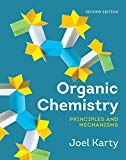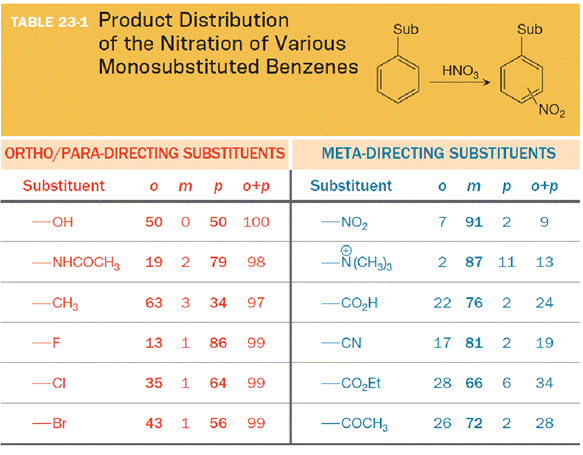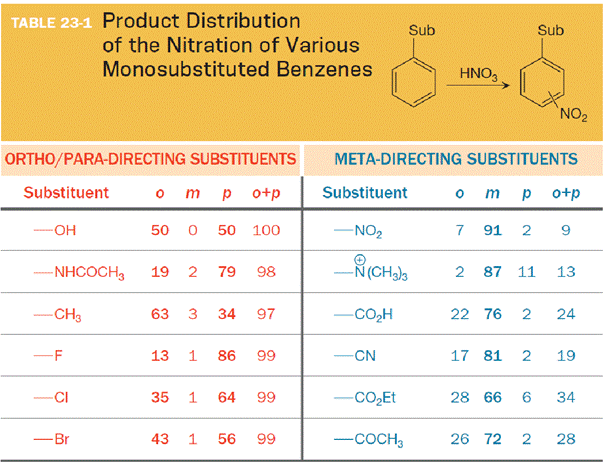
Concept explainers
(a)
Interpretation:
The iodo (–I) and formyl (–CHO) groups are not listed in Table 23-1. The relative amounts of ortho and meta nitration products obtained for each substituent are shown here:

The missing information pertaining to the relative amounts of the para isomers that are produced as well as the sum of the amounts of ortho and para products are to be supplied.
Concept introduction:
The substituent on the benzene ring prior to substitution dictates the regiochemistry of the reaction. Some substituents are designated as ortho/para directors because they lead to product mixtures consisting primarily of the ortho- and para-disubstituted products. Other substituents are designated as meta directors because they favor the formation of the meta-disubstituted product. The results from nitration reactions are summarized in Table 23-1:

(b)
Interpretation:
The iodo (

Based on the information, whether each substituent is an ortho/para director or a meta director is to be determined.
Concept introduction:
The substituent on the benzene ring prior to substitution dictates the regiochemistry of the reaction. Some substituents are designated as ortho/para directors because they lead to product mixtures consisting primarily of the ortho- and para-disubstituted products. Other substituents are designated as meta directors because they favor the formation of the meta-disubstituted product. The results from nitration reactions are summarized in Table 23-1:

Want to see the full answer?
Check out a sample textbook solution
Chapter 23 Solutions
Organic Chemistry: Principles and Mechanisms (Second Edition)
- Predict the product for the reaction between methyl benzoate and each of the following. If no reaction is expected to occur, write “no reaction.” For those reactions that do occur, draw the complete, detailed mechanism. (a) NaBr; (b) NaN(CH3)2; (c) 3-chloropentane; (d) hexanal; (e) CH3Clarrow_forwardWhich of the following best describes why (equation in picture) is not a synthesis reaction?arrow_forward(a) Draw a specific organic reaction for the halogenation addition reaction of alkenes. (b) Also, write the reagents involved in the reaction (c) and name and identify its major and minor products. Lastly, determine if it is syn or anti addition.arrow_forward
- For each pair of isomers, determine the one that will undergo electrophilic aromatic substitution faster. Explain. Hint: See Problem 23.45. (a) o-Dimethylbenzene or m-dimethylbenzene; (b) m-dimethylbenzene or p-dimethylbenzene; (c) 1,2,3,4-tetramethylbenzene or 1,2,3,5-tetramethylbenzenearrow_forwardPlease provide the mechanism and reagents for this reactionarrow_forwardThis is a hydrogenation and carbene addition problem. How do I draw the structure of the major organic product of the reaction shown?arrow_forward
- Draw the structure of each of the following molecules. (a) (R)-1-chloro-1-fluorobutane; (b) (S)-2-chloropentane; (c) (R)-2-chloro-2-methoxypentane;(d) (R)-2,2,3-trichlorobutane; (e) (S)-3-methylhexane; (f) (S)-2-bromo-1-nitropentanearrow_forwardProvide the complete mechanism for the reaction. Please include appropriate arrows, intermediates, and formal charges.arrow_forwardDraw the structure of the expected organic product(s) formed in the following reactions including correct sine echemistry. If the product is racemic write racemic or draw both isomers. Assume all reagents listed are present in excess unless otherwise noted. If no reaction occurs, state "No Reaction".arrow_forward
- Identify the indicated aspects and the principal organic product or products for each of the following reactions. If more than one product is formed, indicate the major product. Indicate stereochemistry wear appropriate.arrow_forwardOrganic Chemistry Question. Please help solve. Sorry that it's multi-part problem; there's actually really no way I can split it into different questions because I don't know what the intermediate answers are. Can you help me solve this problem? Thanks. Provide reasonable product structures for each of the reactions in the image (part of the same chain of reactions). I appreciate itarrow_forwardClassify the following transformation as oxidation, reduction, or neither. Select the single best answer. oxidation reduction neither Give detailed Solution with explanation needed of all options. don't give Handwritten answerarrow_forward
 Organic Chemistry: A Guided InquiryChemistryISBN:9780618974122Author:Andrei StraumanisPublisher:Cengage Learning
Organic Chemistry: A Guided InquiryChemistryISBN:9780618974122Author:Andrei StraumanisPublisher:Cengage Learning
